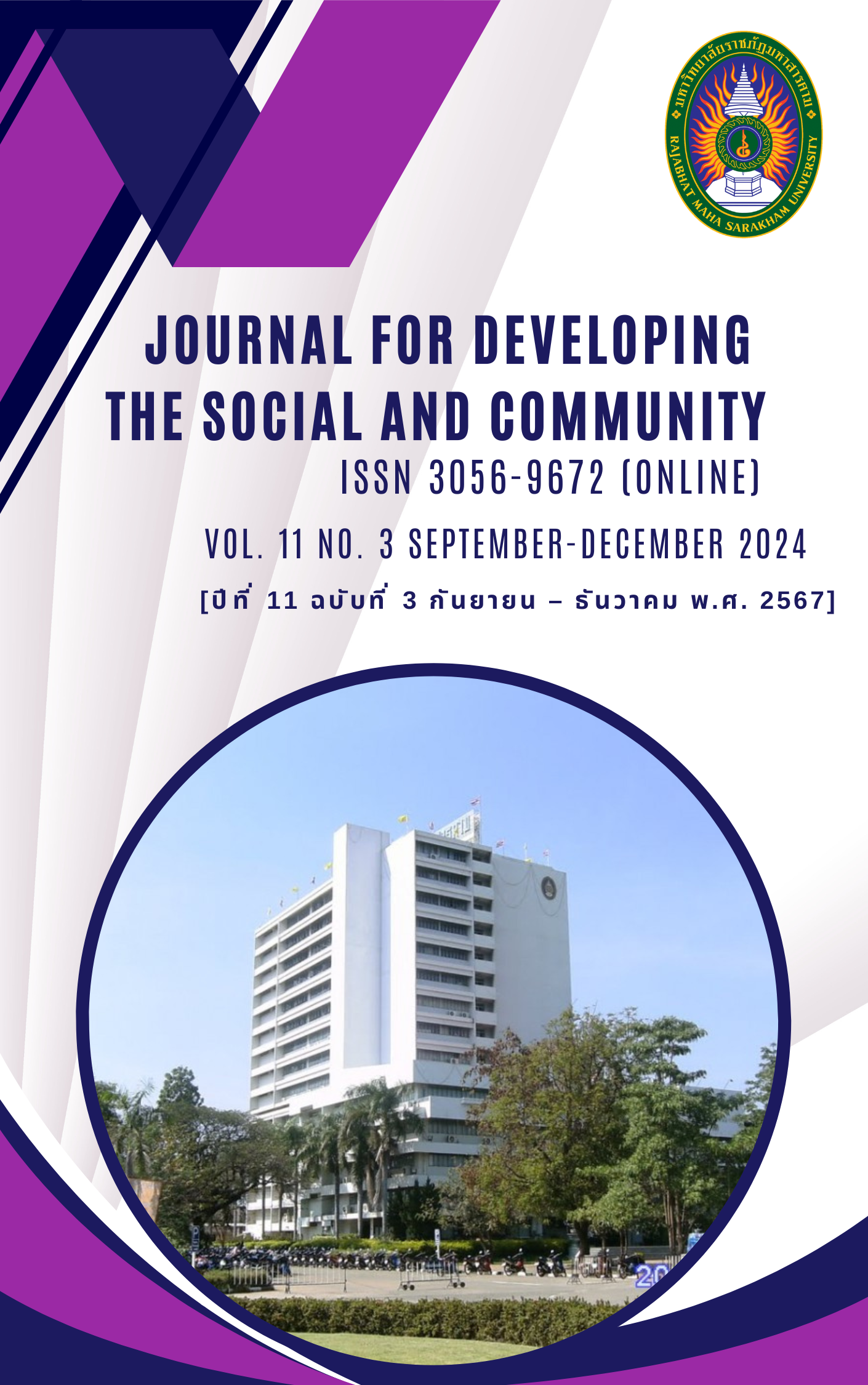Factors Promoting and Limiting Women's Roles in Employment: A Literature Review from 2018 to 2022
Keywords:
Women, Promoting Factors, Limiting Factors, Professional participationAbstract
This research article examines the factors that promote and limit women's participation in the workforce, focusing on a literature review conducted during the period 2018–2022. The study aims to identify key enablers and barriers to women's career engagement through a qualitative approach, utilizing literature from three Thai journal indexing sources: Thaijo, Google Scholar, and Google. Content analysis and interpretation methods were employed.
The findings reveal that 15 variables promote women's roles in the workforce, with five key factors being leadership, participation, education, human rights, and religion. On the other hand, 12 variables were identified as constraints, with the five most critical factors being gender inequality, religious practices, societal acceptance, social equality, and political culture. Additionally, 17 variables influencing women's career engagement were identified, with the most significant being leadership, political participation, education, occupation, and age.
The above-mentioned factors play a vital role in enhancing the effectiveness of women’s employment. The study emphasizes the need for government intervention in policy formulation and the implementation of structural reform initiatives. Such policies should aim to create equal opportunities and reduce social constraints that hinder women’s participation in the workforce.
References
Ali, F., & Syed, J. (2018). From rhetoric to reality: The patriarchal constraints on women's progress in managerial roles in Pakistan. Asia Pacific Journal of Management, 35(3), 903–923.
Catalyst. (2021). The state of women in the workplace. Retrieved from https://www.catalyst.org
Catalyst Research. (2019). Women in leadership: Global perspectives. New York: Catalyst Publications.
Chanawong, V. (2021). Gender inequality in manufacturing and construction industries in Thailand. Bangkok: Kasetsart University Press.
Charlesworth, H. (2019). Gender equality in global politics: Barriers and progress. Human Rights Quarterly, 41(3), 567–589.
Charlesworth, H. & Chinkin, C. (2019). The gender dimensions of international human rights law. Human Rights Quarterly, 41(2), 283–310.
Charoensuek, S. (2018). Women's roles in Thai political arenas: Opportunities and limitations. Governance Administration Journal, 6(3), 89–102.
Chuensuwan, W. (2019). Women's participation in rural communities. Social Science Journal, 15(2), 112–125.
Cornwall, A. & Rivas, A. (2019). Participation as empowerment: A feminist perspective. Development and Change, 50(4), 741–759.
Department of Women's Affairs and Family Institution. (2020). Women's action plan phase 1 (2020–2022).
Eagly, A. H. & Carli, L. L. (2018). Through the labyrinth: The truth about how women become leaders. Harvard Business Review Press.
Eagly, A. H. & Wood, W. (2016). Social role theory of sex differences and similarities: A current appraisal. In P. Van Lange, A. W. Kruglanski, & E. T. Higgins (Eds.), Handbook of theories of social psychology (Vol. 2, pp. 458–476). Sage.
Gender Equality Bureau Cabinet Office. (2021). Gender equality measures in Japan. Retrieved from https://www.gender.go.jp
Heilman, M. E. (2020). Gender stereotypes and workplace bias. Annual Review of Psychology, 71, 615–642.
Inprasert, O. (2018). Gender equality in the labor sector: A case study of Thailand. Economics and Social Sciences Journal, 9(1), 73–86.
International Labour Organization (ILO). (2020). Women in business and management: The business case for change. Geneva: ILO.
International Labour Organization. (2019). Women in the workplace: Global trends and challenges. Geneva: ILO Publications.
Kaewthep, K. (2018). A study of women's roles in Thai society. Bangkok: Chulalongkorn University Press.
Kamhom, R. (2019). Policies and potential development for women. Bangkok: Ramkhamhaeng University Press.
Kelan, E. K. (2019). Gender fatigue: The ideological dilemma of gender neutrality and discrimination in organizations. Canadian Journal of Administrative Sciences, 36(4), 582–595.
Krook, M. L., & True, J. (2020). Women, gender, and political institutions: Progress and setbacks. Politics & Gender, 16(2), 125–142.
Malhotra, A., & Schulte, J. (2018). The role of education in women’s empowerment: Evidence from developing countries. World Development, 105, 304–319.
McKinsey & Company. (2020). Diversity wins: How inclusion matters. Retrieved from https://www.mckinsey.com
Ministry of Labor. (2021). Report on the situation of women workers in Thailand. Bangkok: Ministry of Labor.
National Statistical Office. (2021). Summary report on women's work in Thailand 2021. Retrieved from https://www.nso.go.th
O'Brien, J., & Palmer, D. (2018). Religion and gender inequality in the workplace: A cross-cultural perspective. Cambridge University Press.
OECD. (2019). Women at work in G20 countries. Paris: OECD Publishing.
OECD. (2020). The role of women in the economy. OECD Publishing.
Pakdeekul, P. (2019). Women and career advancement. Social Science Journal, 15(2),45–60.
Phongsuwan, S. (2020). Social beliefs affecting women's occupations. Bangkok: Chulalongkorn University Press.
Ridgeway, C. L. (2018). Gender, status, and the social structure: Where do women stand? Gender & Society, 32(4), 45–67.
Schein, V. E. (2019). Gender and leadership stereotypes: Examining the role of religion in leadership perceptions. Journal of Business Ethics, 153(2), 345–359.
Sen, A. (2020). Women and inequality in the workforce: Challenges and opportunities. Journal of Social Development, 16(2), 210–230.
Songchai, N. (2019). Education and opportunities for women in rural areas. Educational Development Journal, 8(2), 56–68.
Srisombat, J. (2019). Gender inequality and its impact on women's roles in families. Social Science Research Journal, 11(2), 45–59.
Sukaseam, D. (2020). Leadership and women's entrepreneurship in small and medium enterprises in Thailand. Bangkok: Srinakharinwirot University Press.
Thaveesit, S. (2021). Development of women's roles in contemporary society. Social Development Journal, 20(1), 80–95.
Thongkham, S. (2019). Human rights of women in the workplace. Human Rights Journal, 14(2), 98–110.
Uvarnnno, T. (2018). Gender bias in Thai society. Bangkok: Chulalongkorn University Press.
UN Development Programme. (2022). Gender equality in the labor market. New York: UNDP Press.
United Nations. (2020). The sustainable development goals report 2020. New York: United Nations.
Wattanasiri, W. (2020). Thai political culture and obstacles to women's leadership. Politics and Society Journal, 7(2), 45–58.
Wongthongdee, P. (2019). The impact of religion on women's roles in Thailand. Bangkok: Thammasat University Press.
World Economic Forum. (2021). Global gender gap report 2021. Retrieved from https://www.weforum.org
Downloads
Published
How to Cite
Issue
Section
License
Copyright (c) 2024 Journal for Developing the Social and Community

This work is licensed under a Creative Commons Attribution-NonCommercial-NoDerivatives 4.0 International License.
Articles that are published are copyrighted by the authors of the articles







